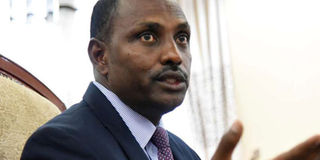Unions, employers have vital roles to play in NSSF board

Labour Cabinet Secretary Ukur Yattani addresses a board meeting at NSSF building on March 1, 2018. PHOTO | EVANS HABIL | NATION MEDIA GROUP
What you need to know:
Relations Court, especially with what they regard as new jurisprudence on reinstatement of sacked employees.
Cotu and the FKE must stand their ground against this latest attempt by ruling elites to undermine the principle of tri-partism.
The board needs to have strong body committees staffed with experienced and qualified individuals.
Having just come out of Labour Day celebrations, I thought it was the opportune time to reflect on sources of concerns and uncertainty in the labour market as we approach the middle of the year
There is rising concern among employers and labour lawyers about recent judgments and rulings made by the Employers and Industrial
Relations Court, especially with what they regard as new jurisprudence on reinstatement of sacked employees.
Frequent strikes and the fact that industrial disputes in the public sector take too long to resolve, is also cited as having precipitated a climate of instability in the labour markets
EMERGING ISSUES
During the celebrations on Tuesday, the CEO of the Federation of Kenya Employers (FKE), Ms Jackline Mugo, highlighted other emerging issues, including the rising number of redundancies, especially in the agricultural and financial sectors and the shrinking formal sector.
Still, the biggest issue of the day and likely source of instability is the controversy surrounding the move by elements within President Uhuru Kenyatta’s administration to grab control of the National Social Security Fund and the National Hospital Insurance Fund.
In the spirit of tri-partism, the founding fathers of these two institutions introduced a corporate governance regime, whereby both the Central Organisation of Trade Unions and the FKE would be represented on the boards of the NSSF and the NHIF.
ELITES
This is what elements within the administration want to do away with by sneaking in a miscellaneous amendment Bill that is before Parliament. Control of these two institutions comes with big bucks. Cotu and the FKE must stand their ground against this latest attempt by ruling elites to undermine the principle of tri-partism, upon which industrial peace in this country is founded.
What must we do to rescue these two key workers’ institutions from the clutches of greedy rent-seeking elites? How do we shield them from constant meddling by Cabinet secretaries and turn them into properly governed entities primarily accountable to their memberships? Isn’t it amazing that instead of addressing such pertinent questions, somebody within government believes that the removal of Cotu and FKE from their boards is more urgent?
ACCOUNTABLE
The NHIF has evolved into a multi-billion affair. We need to re-think its corporate governance. We have reached a point where its management and board must be made to be more directly accountable to the fund’s membership.
Currently, the board has too many government representatives. The institution has reached a point where it should now be run by a board and management whereby only people with specific skills can be appointed. The board of the NHIF needs to have strong body committees staffed with experienced and qualified individuals in finance, medical insurance, audit and quality assurance. The government representatives should be replaced with those of key contributor groups such as civil servants’ unions and teachers.
FINANCIAL DISCLOSURE
It is time the government owned up to the fact that it does not own the NHIF. Contributors should be given regular operational and financial disclosure.
Which brings us to the NSSF. Kicking out Cotu and FKE from its board is a sinister move. The priority should be how to make it accountable to contributors.
Unlike other retirement schemes, the NSSF does not hold annual general meetings where contributors can interrogate the quality of its investment portfolios. The fund’s first and ever AGM was held in 2012.
NSSF contributors do not receive regular statements to allow them to track how their savings are growing. Nobody cares where pensioners’ money is invested and whether it is earning good returns.
If the pensioners’ body was being managed well, the ratio of administrative expenses to the net assets would be way below what it is now.
INVESTMENTS
There were times when administrative expenses consumed almost half of the monthly contributions. If it were being run well, money earned from investments would be distributed to members and credited to their accounts every year-end. The lump sums would be much higher.
Over the years, the government has behaved as if the NSSF existed merely to bail out mismanaged State-owned banks.
Today, its billions are stuck in the National Bank of Kenya and Consolidated Bank. Successive regimes have treated the NSSF as an appendage of the State from which they get resources to rescue badly run banks. I keep praying that some public-spirited MP will one day come up with a Bill to amend the NSSF Act to allow contributors to elect their own trustees.





